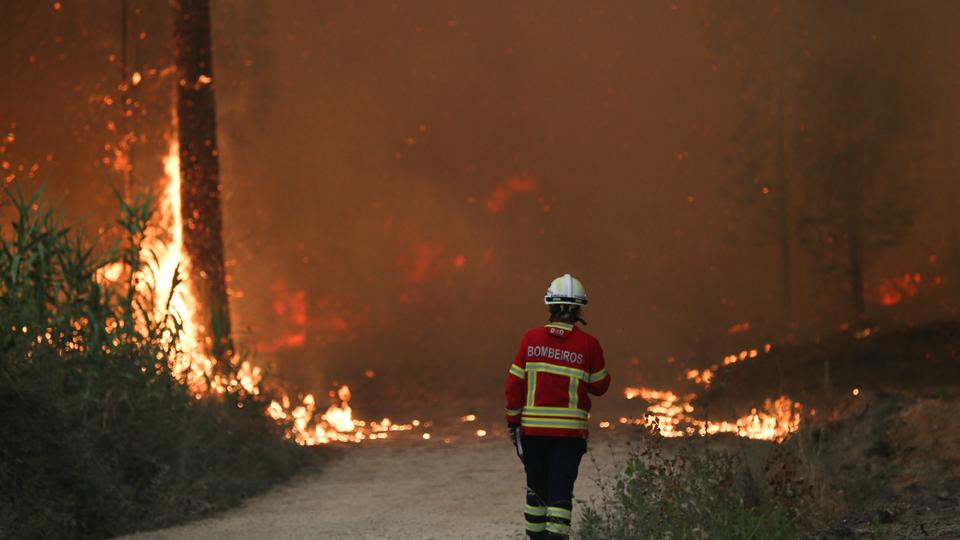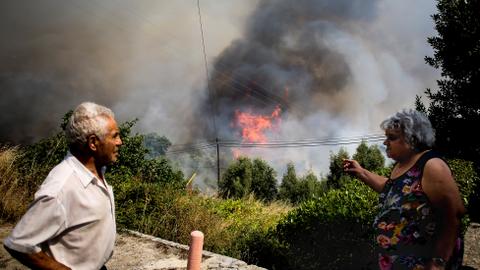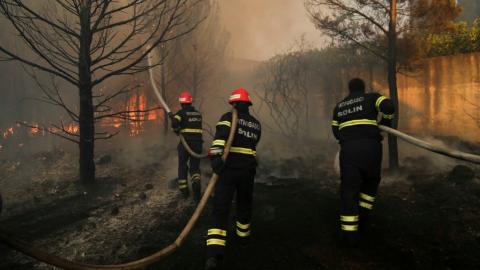World Meteorological Organization head says current negative climate trend to continue until at least 2060s
Peter Kenny |19.07.2022

A women cool off near pool as heatwave hits London, United Kingdom on July 19, 2022. The UK Meteorological Service (Met Office) issued an extreme temperature warning that temperatures could reach 39 degrees Celsius, posing a serious risk on health.
( Rasid Necati Aslim - Anadolu Agency )
GENEVA
Europe’s current heatwave is breaking records, detrimentally impacting people’s health, the economy, agricultural production, and tourism, and the trend is likely to become more frequent for decades, the chief of world’s weather group said Tuesday.
“The negative climate trend will continue, at least until the 2060s, independent of our success in climate mitigation efforts,” World Meteorological Organization (WMO) Secretary-General Petteri Taalas told journalists at a UN press conference in Geneva.
“And that means these weather conditions are becoming more common.”
During the press conference on the current European heatwave, he said that the world has better means to adapt to heatwaves than in the past as in many countries, people have improved the facilities for dealing with heatwaves and know more about the health risks related to such kinds of events.
Taalas said the awareness of climate change is much higher than it used to be.
He said that ways to alleviate it can be seen in the energy sector with climate-friendly solutions as well as in transport and people’s diets, while prices related to medicaments are lowering.
“But the same people who have been vulnerable to the COVID-19 pandemic are especially vulnerable to heatwaves,” said the WMO head.
“So, we expect to see increased deaths among the elderly and those people who are already sick. We are also expecting to see major impacts on agriculture.”
Harvests lost
In past European heatwaves, large parts of the harvests were lost.
“And under the current situation we are already having this global food crisis because of the war in Ukraine, so this heatwave is going to have further negative impacts on agricultural activities.”
He said such heatwaves would become more frequent during the coming decades.
Taalas also said the UK had already broken its all-time high temperature earlier on Tuesday, reaching 39.1 degrees Celsius (102.2 degrees Fahrenheit). He expected it to rise above 40C (104F) later in the day.
Using a sports analogy, the WMO chief said when sports people engage in doping, they perform with a higher intensity than usual.
“And we have been doping our atmosphere by injecting more greenhouse gases, especially carbon dioxide, into the atmosphere.”
GENEVA
Europe’s current heatwave is breaking records, detrimentally impacting people’s health, the economy, agricultural production, and tourism, and the trend is likely to become more frequent for decades, the chief of world’s weather group said Tuesday.
“The negative climate trend will continue, at least until the 2060s, independent of our success in climate mitigation efforts,” World Meteorological Organization (WMO) Secretary-General Petteri Taalas told journalists at a UN press conference in Geneva.
“And that means these weather conditions are becoming more common.”
During the press conference on the current European heatwave, he said that the world has better means to adapt to heatwaves than in the past as in many countries, people have improved the facilities for dealing with heatwaves and know more about the health risks related to such kinds of events.
Taalas said the awareness of climate change is much higher than it used to be.
He said that ways to alleviate it can be seen in the energy sector with climate-friendly solutions as well as in transport and people’s diets, while prices related to medicaments are lowering.
“But the same people who have been vulnerable to the COVID-19 pandemic are especially vulnerable to heatwaves,” said the WMO head.
“So, we expect to see increased deaths among the elderly and those people who are already sick. We are also expecting to see major impacts on agriculture.”
Harvests lost
In past European heatwaves, large parts of the harvests were lost.
“And under the current situation we are already having this global food crisis because of the war in Ukraine, so this heatwave is going to have further negative impacts on agricultural activities.”
He said such heatwaves would become more frequent during the coming decades.
Taalas also said the UK had already broken its all-time high temperature earlier on Tuesday, reaching 39.1 degrees Celsius (102.2 degrees Fahrenheit). He expected it to rise above 40C (104F) later in the day.
Using a sports analogy, the WMO chief said when sports people engage in doping, they perform with a higher intensity than usual.
“And we have been doping our atmosphere by injecting more greenhouse gases, especially carbon dioxide, into the atmosphere.”
Google Cloud data center in London faces outage on UK's hottest day
Yesterday

(Reuters) - A Google Cloud data center in London faced an outage on Tuesday, according to an update on the Alphabet Inc unit's status page, as temperature in the UK soared to a record high.

© Reuters/Dado RuvicIllustration shows Google Cloud service logo
Google Cloud said it was a "cooling related" failure at one of the buildings and began at 1:13 pm ET (6:13 pm BST).
A "small set" of customers are impacted, according to the update on the status page. A part of the issue still persists. (https://bit.ly/3OdAFig)
Britain recorded its hottest day ever on Tuesday, with the temperature exceeding 40C (104F) as a heatwave gripping Europe intensified, forcing train tracks to buckle and fuelling a spate of fires across London.
(Reporting by Yuvraj Malik in Bengaluru; Editing by Krishna Chandra Eluri)
Yesterday
(Reuters) - A Google Cloud data center in London faced an outage on Tuesday, according to an update on the Alphabet Inc unit's status page, as temperature in the UK soared to a record high.

© Reuters/Dado RuvicIllustration shows Google Cloud service logo
Google Cloud said it was a "cooling related" failure at one of the buildings and began at 1:13 pm ET (6:13 pm BST).
A "small set" of customers are impacted, according to the update on the status page. A part of the issue still persists. (https://bit.ly/3OdAFig)
Britain recorded its hottest day ever on Tuesday, with the temperature exceeding 40C (104F) as a heatwave gripping Europe intensified, forcing train tracks to buckle and fuelling a spate of fires across London.
(Reporting by Yuvraj Malik in Bengaluru; Editing by Krishna Chandra Eluri)
Portugal reports 1,000 deaths due to ongoing heatwave
Health chief calls for readiness "for periods of high temperatures" in the southern European country, where temperatures surpassed 40 degrees Celsius last week.

High temperatures, ongoing drought and poor forest management have been blamed for several wildfires sweeping across Portugal. (Reuters Archive)
Portugal has reported more than 1,000 deaths due to the current heatwave, with the health chief warning that the country must gear up to cope with the effects of the climate crisis as temperatures continue to rise.
"Portugal ... is among one of the areas of the globe that could be (more) affected by extreme heat," Graca Freitas, head of health authority (DGS), told the Reuters news agency.
"We have to be more and more prepared for periods of high temperatures."
Temperatures across drought-stricken Portugal surpassed 40 degrees Celsius last week. Although they have dropped in the last few days, Freitas said they remained above normal levels for this time of the year.
DGS previously reported 238 excess deaths due to the heatwave from July 7 to 13, but Freitas said the number of fatalities has now increased to 1,063 for the period up to July 18.
'Increase in mortality'
High temperatures, the ongoing drought and poor forest management have been blamed for several wildfires sweeping across Portugal. Firefighters also are combating blazes in other southern European nations, including in Spain.
Carlos Antunes, a researcher at Lisbon University's faculty of sciences, said in an interview that the data showed those most likely to die due to heatwaves were elderly people.
He said the number of deaths in the future will depend, among other things, on the preventive measures people adopt to protect themselves, how care homes tend to their residents and the adaptation of infrastructures.
"With climate change, it is expected that this increase in mortality will intensify, and therefore we have to take measures at the public health level to minimise the impact," Antunes said.
Portugal has reported more than 1,000 deaths due to the current heatwave, with the health chief warning that the country must gear up to cope with the effects of the climate crisis as temperatures continue to rise.
"Portugal ... is among one of the areas of the globe that could be (more) affected by extreme heat," Graca Freitas, head of health authority (DGS), told the Reuters news agency.
"We have to be more and more prepared for periods of high temperatures."
Temperatures across drought-stricken Portugal surpassed 40 degrees Celsius last week. Although they have dropped in the last few days, Freitas said they remained above normal levels for this time of the year.
DGS previously reported 238 excess deaths due to the heatwave from July 7 to 13, but Freitas said the number of fatalities has now increased to 1,063 for the period up to July 18.
'Increase in mortality'
High temperatures, the ongoing drought and poor forest management have been blamed for several wildfires sweeping across Portugal. Firefighters also are combating blazes in other southern European nations, including in Spain.
Carlos Antunes, a researcher at Lisbon University's faculty of sciences, said in an interview that the data showed those most likely to die due to heatwaves were elderly people.
He said the number of deaths in the future will depend, among other things, on the preventive measures people adopt to protect themselves, how care homes tend to their residents and the adaptation of infrastructures.
"With climate change, it is expected that this increase in mortality will intensify, and therefore we have to take measures at the public health level to minimise the impact," Antunes said.


No comments:
Post a Comment